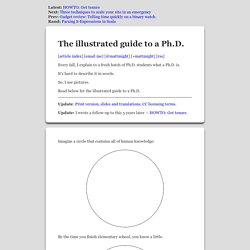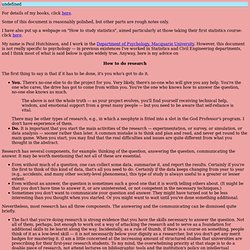

The illustrated guide to a Ph.D. Imagine a circle that contains all of human knowledge: By the time you finish elementary school, you know a little: By the time you finish high school, you know a bit more: With a bachelor's degree, you gain a specialty: A master's degree deepens that specialty: Reading research papers takes you to the edge of human knowledge: Once you're at the boundary, you focus: You push at the boundary for a few years: Until one day, the boundary gives way: And, that dent you've made is called a Ph.D Of course, the world looks different to you now: So, don't forget the bigger picture: Keep pushing.

There's a bit more below, but I also wrote a follow-up 5 years after the illustrated guide which may be of interest -- HOWTO: Get tenure. Related posts If you like these posts, then I recommend the book A PhD Is Not Enough Get it in print; fund students; save lives By request, a print version of The Illustrated Guide to a Ph.D. is on sale. Click here to preview or buy it. Why biology? License: Creative Commons Resources. How to do research (advice) Undefined For details of my books, click here.

Some of this document is reasonably polished, but other parts are rough notes only. I have also put up a webpage on "How to study statistics", aimed particularly at those taking their first statistics course: click here. My name is Paul Hutchinson, and I work in the Department of Psychology, Macquarie University. However, this document is not really specific to psychology --- in previous existences I've worked in Statistics and Civil Engineering departments, and I think most of what is said below is quite widely true.
How to do research The first thing to say is that if it has to be done, it's you who's got to do it. You. Research has several components, for example: thinking of the question, answering the question, communicating the answer. Even without much of a question, one can collect some data, summarise it, and report the results. It is only natural for a student to ask "What will get me good marks? " To get ideas, expose yourself to them. Research essay writing: help, ideas, topics, examples. Thesis Take care in selecting your thesis.

This is really a type of persuasive essay, but you don't want to be stuck either just repeating someone else's opinion, or citing all the same sources. Try to come up with an original thesis or take an aspect of someone's thesis and develop it. You can also take a thesis and "transplant" it into different circumstances. For example, use tools of modern economics to argue about the role of medieval guilds in the development of early European settlements. Your thesis is the most critical aspect of your research essay. Body Again, it's a marshalling of facts to support your argument. Conclusion Typically you summarize your arguments. What are markers looking for? As usual, a clearly-written, well organized essay.
Usually you are given the topic for your research essay by a teacher, but if not you need to choose the essay topic that you are familiar with. How to Use the Harvard Style of Referencing - a knol by Norman Creaney.